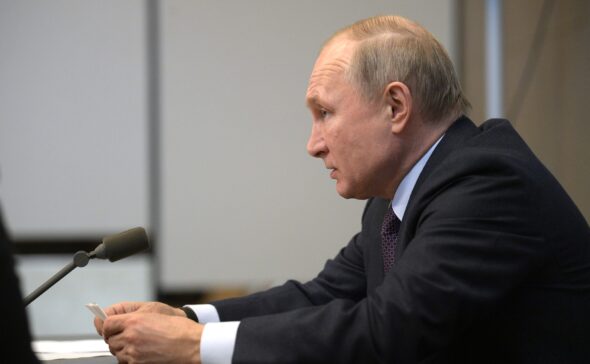Alexander Lukashenko has threatened Poland with cutting off gas supplies through the Yamal gas pipeline in retaliation for sanctions related to the border crisis. However, this decision is up to Vladimir Putin who seems to be preoccupied with coming up with new crises to intimidate the West, and force it to offer concessions on various issues with the contentious Nord Stream 2 on top of the list, which may also include undermining the efforts of post-soviet states to affiliate with the West – writes Wojciech Jakóbik, editor in chief at BiznesAlert.pl.
Lukashenko’s empty threats
The President of Belarus, which is also responsible for the border crisis in Poland, Lithuania and Latvia, reacted to the possibility of introducing new sanctions against his country by threatening with stopping gas supplies through the Yamal gas pipeline, which runs across Belarusian territory. Lukashenko’s threats are hollow. First, the level of gas supplies through Belarus depends on the supplier, namely Russia’s Gazprom, and the operator of this section of the pipe, which is… Gazprom Belarus Transgaz. Russians seized Belarus’s gas transmission pipelines in 2011 in exchange for another discount on gas supplies and cancelling Minsk’s debts. President Vladimir Putin responded to Lukashenko’s threat by saying that Minsk can stop supplies to Europe. „Theoretically, Lukashenko as president of the transit country, can probably give the order to stop our supplies to Europe, although it would be a violation of our transit contract and I hope that this will not happen,” Putin said on Rossiya TV. This announcement should be seen as another threat, an attempt to shift responsibility for the border crisis and the possible gas crisis away from Russia, and perhaps as another attempt at pressuring Europe to launch the disputed Nord Stream 2 gas pipeline. So far, the Russians have unsuccessfully argued that only certification and the start of deliveries along this route will lower gas prices in the face of the energy crisis. However, the European Union and the US, have accused Russia not only of causing the border crisis, but also of being co-responsible for the record spike in gas prices. Perhaps Russia is trying to strengthen its negotiating position on this issue by threating to cut gas transmission via Belarus.
In fact, there are already alternative routes to the Yamal pipeline. Its capacity in Poland is 31 billion cubic meters a year, and it was fully booked for the gas year 2021/2022. The capacity of the pipe from Ukraine is about 5 billion cubic meters a year, it was also fully contracted for the gas year 2021/2022. Poland imports about 10 billion cubic meters of gas from Russia annually via those routes, and the remaining capacity goes to other consumers in Europe. However, this is a small volume compared to the capacity of the point in Veľké Kapušany on the border of Ukraine and Slovakia, which has a capacity of 71.2 billion cubic meters for deliveries from Russia to Europe. The interruption of gas supplies through the Yamal gas pipeline does not threaten the energy security of Poland or the European Union. Such a break could indeed pose a problem only if it was combined with supply problems through Ukraine, especially in the face of the looming necessity to use the gas from Europe’s storage facilities. Only recently have the Russians started to replenish gas reserves, for example, in the VNG facility called Katharina, which provides gas to East Germany, including Berlin. In this context, the real threat would be the interruption or reduction of gas supplies via Ukraine. Depending on the scale, it could be caused by a breakdown, like the fire at the Urengoy plant in the Yamal oblast in the summer of 2021, other technical problems like wet gas in 2017, hybrid attacks on Ukraine, an attempted political coup in Kiev on the pretext of supply problems, or a conventional attack by Russia on this country. It should be reminded that, according to the US State Department, the border crisis is used by the Russians to divert attention from the buildup of troops on the border with Ukraine. If the Russians are indeed preparing a new aggression over the Dnieper, the threat of the Yamal gas pipeline being turned off should be seen not only in the context of the attempts to force Nord Stream 2, but also as another distraction from the actions in Ukraine. It should be emphasized that there is no point in using Putin as a bogeyman. Fluctuations in gas supply through the Yamal to Poland and Germany recorded in November did not happen due to any problems with the implementation of the contracted deliveries. Even stopping gas supplies from Russia through Ukraine and Belarus would be possible to survive, albeit at great expense. However, such decisions would undermine the credibility of the Kremlin, because it would not be possible to shift all responsibility to the transit countries. Front-page news about a gas crisis in Poland serve the interests of the Kremlin, which is amassing forces on Ukraine’s border.
The sum of all fears
The situation may unfold differently, as the analysts from the Centre for Eastern Studies and the Polish Institute of International Affairs point out. Russia may be using the crises mentioned above as the sum of all of Europe’s fears to improve its bargaining position. The border crisis could potentially lead to a Russian intervention agreed with the West to increase its influence in Belarus, for example by deploying Russian armed forces on the border with Poland. Increasing influence in Minsk could also end its affair with the idea of diversifying gas and oil supplies with the help of the West, as it had tried before the bloody showdown with the opposition after the rigged elections in 2019. The border and energy crisis could also lead to the launch of Nord Stream 2, and undermine the efforts of Ukraine and other post-soviet states to enter a path to the West. This happened, for instance, in Moldova, which was forced to sign a new gas contract with Gazprom, which included two clauses that put a break on the gas sector reform based on EU regulations. One can imagine a similar strategy will be applied to Ukraine if a gas or military crisis leads to a political upheaval in Kiev. For this reason, it is necessary to respond with sanctions that will limit Moscow’s ability to destabilise the situation: freezing the Nord Stream 2 project, raising the economic costs of an escalation in Belarus and Ukraine, not agreeing to deals with Moscow before a verifiable deescalation. Yielding to the pressure from Russia may result in the opposite – a continued escalation. According to the Suddeutsche Zeitung, if it is to be believed at all, the US has urged Germany, France and the UK to threaten Russia with sanctions against Nord Stream 2, Gazprom and Rosneft in case of new aggression in Ukraine.









